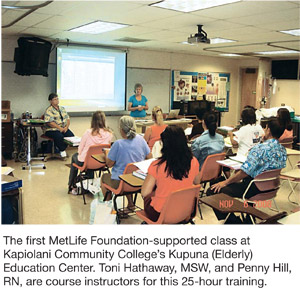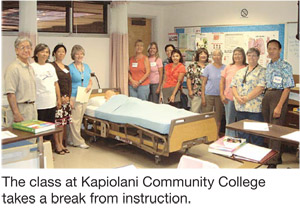
August 11, 2009
After high school, you probably went on to receive more specialized training at a college or on the job. Perhaps throughout the course of your life, you have taken night classes or Internet courses, improving your knowledge and expertise on anything from 19th-century American poetry to industrial electrical construction. But most of us never receive preparation for the one role we most assuredly will take on at some point in our lives: caregiving. Sure, many people navigate their way through parenthood, marriage, and eldercare, picking up resources and advice along the way, but the right education could make caregiving much easier—especially for those caring for an older loved one with a chronic disease like Alzheimer’s.
Community College Caregiver Training Initiative
Statistics show a growing need for home-based caregivers. Approximately 20 percent of American adults who need caregiving assistance aren’t able to find help, whether paid or voluntary, says the International Longevity Center-USA (ILC-USA). This trend will likely continue as Baby Boomers age—leading to a more significant number of older adults and a reduced number of health care professionals. ILC-USA predicts that the need for in-home caregivers will double by 2050. However, the available pool of family caregivers is shrinking, and at the same time, the caregiving profession is experiencing a severe and worsening shortage of paid caregivers, says ILC-USA.
To defer a caregiving crisis, the number of trained professional and family caregivers must increase over the coming years. Community colleges may turn out to be ideal recruitment centers for both types of caregiver. Through the Caregiving Project for Older Americans, ILC-USA has collaborated with the Schmieding Center for Senior Health and Education (SCSHE) to create the Community College Caregiver Training Initiative, which aims to increase the number of qualified caregivers throughout the country by providing them with education and resources through their local community colleges.
According to the American Association for Community Colleges, 60 percent of all new registered nurses receive a degree from a two-year institution. This makes community colleges a prime training ground for professional caregivers.
“Since a lot of community colleges already have nursing programs, many could easily add a class on professional caregiving,” points out Megan McIntyre, director of communications for ILC-USA.
 “Community colleges play a vital role in educating in-home caregivers as our country faces an increasing need for quality, accessible, affordable care,” says Robert N. Butler, MD, president, and CEO of the ILC-USA and co-director of The Caregiving Project for Older Americans.
“Community colleges play a vital role in educating in-home caregivers as our country faces an increasing need for quality, accessible, affordable care,” says Robert N. Butler, MD, president, and CEO of the ILC-USA and co-director of The Caregiving Project for Older Americans.
To put this theory in action, ILC-USA offers annual grants to community colleges to either establish a caregiving program or to enhance an existing one; MetLife Foundation funds these grants. The initiative is in its second year, and so far, the response has been excellent, says McIntyre. “We were surprised at how large the response was, but it was encouraging,” she says.
“The tremendous response and high quality of the submitted proposals underlie the demand for well-trained home caregivers,” says Sibyl Jacobson, president of MetLife Foundation. “The award winners exemplify that community colleges can be a leading force in improving the nation’s caregiving workforce,”
“The number of high-quality training programs submitted was exceptional,” agrees Kenneth Knapp, Ph.D., project manager for the Caregiving Project and senior research analyst at the ILC-USA. “We hope this initiative continues to highlight the important role community colleges can play in training our nation’s professional and family caregivers.”
A Diversity of Communities and Programs
The grants are available to community colleges nationwide. “We try to make it geographically variable throughout the country so that we can reach a lot of communities,” says McIntyre. Community colleges that have already won grants for the initiative represent a diverse collection of communities across the country—serving both urban and rural communities as well as minority populations.
“One of the community colleges that received a grant last year serves a large Native American population, so they tailored their curriculum to make sure it was culturally relevant to the population they’re teaching,” says McIntyre.
In addition to the regional accessibility of the grants, the guidelines are simple. There are very few parameters the colleges have to follow when submitting a grant proposal. “We try not to restrict what they’re applying for because we like creative and new ideas,” says McIntyre. “It’s a wide variety, what the colleges have used the grant money for. Some might do something like video-conferencing their caregiving training classes to their satellite branches in rural areas.”
“The colleges selected represent the variety of innovative training programs that promise to produce quality in-home caregivers,” says Dr. Butler.
A Family Component
There is one feature required in each grant proposal: The proposed program must address family caregivers. “It can be a program primarily for training professional caregivers, but it must have a family component; that’s the only specification we have,” says McIntyre. “We’re very strict in saying that some part of their grant has to be family-based. It can be a class for family caregivers, or maybe just a conference once a semester.
“While we think it’s important to train professional caregivers, the purpose of the grant is to make sure family caregivers are educated as well. So much of the caregiver responsibilities with older adults fall on family members, whether it’s a spouse or grown children and grandchildren. That trend is growing, so that’s something we want to focus on.”
A Caregiving Program at Work
One of the beneficiaries of a 2008 grant was the Elder Stay at Home in Hawaii program offered at the Kapuna Elder Education Center of Kapiolani Community College in Honolulu, Hawaii. The Kapuna Elder Education Center is the only official gerontology program in the University of Hawaii community college system; however, Hawaii has one of the fastest growing senior populations in the United States, says Cullen T. Hayashida, Ph.D., long-term care coordinator at the Kapuna Education Center.
After receiving its grant, Kapiolani Community College sent two of its faculty to Arkansas to receive further training SCSHE. “Our Elder Stay at Home Program is based on their groundbreaking work,” says Dr. Hayashida.
While there, Kapiolani faculty received training on teaching a three-tiered home care program, which includes Elder Pal, Personal Care Assistant and Home Care Assistant. “All three levels are oriented toward home and community-based care,” says Dr. Hayashida. “They are distinct from the current state and Medicare CNA (certified nursing assistant) training that emphasizes institutional nursing home care.”
Also, the 150 hours required for CNA training is resulting in a shortage of trained home care workers, says Dr. Hayashida. “Less training is needed for those who may require lighter care at less cost. There has been nothing in the state to fulfill that training requirement. The shorter, tiered training approach is attractive to many home care workers who can start working after the first level and then continue to take the next level of training if desired. We are finding that many family caregivers are also interested in this training approach.”
In November 2008, Kapiolani Community College offered its first class in the Elder Stay at Home course. The first-level (Elder Pal) course contained students who represented a full spectrum of Hawaii’s multi-ethnic culture. A second-level class will be offered in early 2009. “At least half expect to take the next level,” confirms Dr. Hayashida. “The feedback from the students has been very positive.”
 About International Longevity Center-USA and MetLife Foundation
About International Longevity Center-USA and MetLife Foundation
International Longevity Center-USA
International Longevity Center-USA (ILC-USA) was founded in 1990 by world-renowned gerontologist and Pulitzer Prize winner Robert N. Butler, MD. It is the first nonprofit, nonpartisan, international research, policy and education organization formed to educate individuals on how to live longer and better and to advise society on how to maximize the benefits of today’s age boom. To learn more about International Longevity Center-USA, visit their website at www.ilcusa.org.
MetLife Foundation
MetLife Foundation was established in 1976 by MetLife to carry on its long-standing tradition of corporate contributions and community involvement. Since then, the Foundation has been involved in a variety of aging-related initiatives, including those that address issues of Alzheimer’s disease caregiving, intergenerational activities, mental fitness, health and wellness programs, and civic involvement. To learn more about the work of the Foundation, visit MetLife’s website at www.metlife.org.











